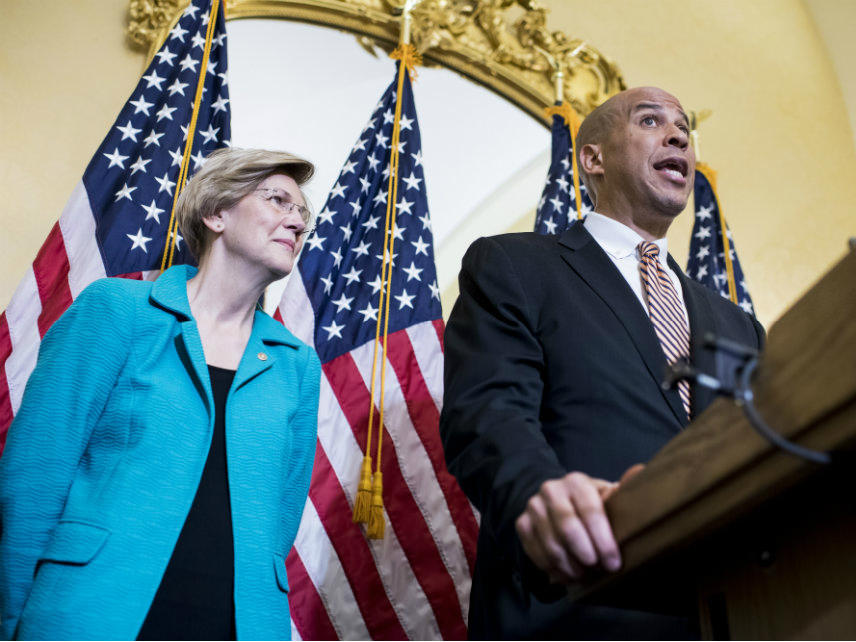Bill Introduced in Congress to Ban Shackling and Solitary Confinement of Pregnant Women
Because that's a thing that happens in the United States.


Two Democratic senators, Cory Booker of New Jersey and Elizabeth Warren of Massachusetts, introduced legislation Tuesday to improve the treatment of female inmates in federal prisons, including banning solitary confinement and shackling of pregnant women.
The Dignity for Incarcerated Women Act, co-sponsored by Sens. Dick Durbin (D-IL) and Kamala Harris (D-CA), would also increase visitation rights for inmates, provide free telephone and video conference calls, and require federal prisons to provide tampons and sanitary napkins to inmates free of charge.
Women are the fastest growing segment of the U.S prison population. The female prison population has grown by 700 percent since 1980, Booker said at a press conference Tuesday morning on Capitol Hill. But they struggle to maintain contact with their children because of exorbitant prison phone fees, receive proper medical care, and maintain their basic dignity, forcing them to "have to make difficult choices whether to get price gouged to communicate with family or buy basic health products,' Booker said.
"If you listen to their testimony," Booker said, "it brings a shame to what's happening in the U.S., and it violates our common values and principles."
Women in prison have higher rates of mental illness, drug dependency, and histories of sexual and physical abuse. The vast majority of them are also mothers.
"Over half of women in prison and 80 percent of women in jail have children," Warren said. "The majority of women in prison, as Sen. Booker said, are themselves victims of physical or sexual abuse. It means we're talking about women who have already faced enormous challenges in their lives, who are trying to hold families together, and who end up incarcerated."
One of those women was Andrea James, now the executive director of the National Council for Incarcerated and Formerly Incarcerated Women and Girls. In 2009, James was sentenced to 24 months in federal prison for a nonviolent crime. She had a five-month-old child at the time.
"When I entered that prison in Danbury, Connecticut in 2010, I was coming in as a former criminal defense attorney," James said at the press conference. "I didn't think there was anything else anybody could tell me about how broken our criminal justice system is. I was stunned and heartbroken at what I encountered walking into that federal prison crammed full of 2,000 women."
Booker and Warren's bill does not currently have any Republican co-sponsors, although Booker said he is reaching out to GOP senators who haveregularly joined him on criminal justice bills in the past. The bill's main priority of maintaining connections between incarcerated mothers and their families is an issue that should appeal to conservatives, Booker and Warren said.
The federal Bureau of Prison announced in 2008 it would stop shackling women while they were giving birth, but it still otherwise allows the practice. While the bill would only apply to the federal prison system—which currently holds about 12,500 female inmates, most of them for drug crimes—the senators and advocates like Jessica Jackson Sloan, the national director of the criminal justice reform group #Cut50, hope it would set an example for states and counties, where the shackling of women in labor still occurs.
"The fact that we are taking one of the most joyous moments of their life—the moment you give birth and become a mother—and shackling them during that moment, ripping the baby away, and not even providing a way to even begin to foster this child that they've just spent nine months growing and bringing into this world, is shocking and disturbing and disgusting," Sloan says. "We know there are models out there, like overnight visitation pilot programs, that have shown to have a meaningful impact on the long-term bond between mother and child, and even the mother's recidivism rate and ability to get back on her feet after incarceration and turn her life around."
Much of the growth in the female inmate population is happening in county jails, but research and public policy addressing "the precipitous rise in the number of women in jail" has lagged behind, a study last year by the Vera Institute reported.
The number of women in jail has risen from less than 8,000 in 1970 to nearly 110,000. "Once a rarity, women are now held in jails in nearly every county—a stark contrast to 1970, when almost three quarters of counties held not a single woman in jail," the report said.
Earlier this year, a woman sued the Milwaukee County Jail for being subjected to repeated sexual assaults by a guard. She also said she was shackled while giving birth. The lawsuit alleged that at least 40 other women since 2011 had been forced to give birth while shackled to hospital beds. A jury awarded her $6.7 million in June.
Another woman is also suing the Milwaukee County Jail, alleging that poor medical care led to a miscarriage during her third trimester.
The treatment of incarcerated women in the U.S. comes as a surprise to many, Sloan said.
"We just ran into [California Lieutenant Governor] Gavin Newsom over at Dirksen," Sloan said, referring to one of the Senate office buildings next to the Capitol Building. "I told him why we were here, and he said, 'What? They do that?' That's the shock that we've gotten from everybody."


Show Comments (51)